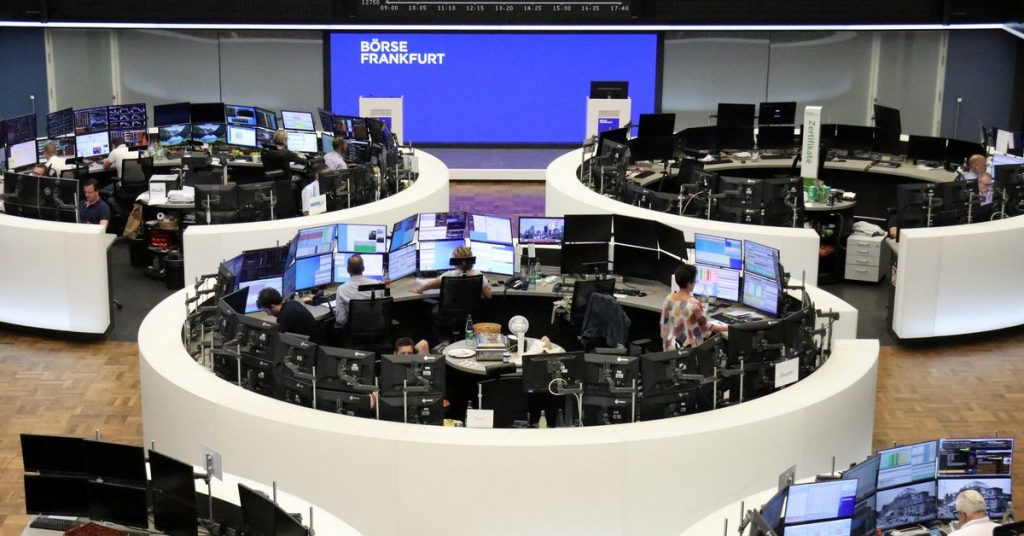Register now for FREE limitless entry to Reuters.com
NEW YORK/LONDON, Aug 30 (Reuters) – World shares tumbled once more on Tuesday amid issues in regards to the likelihood of extra rate of interest hikes in Europe and the US, after knowledge confirmed financial development and inflation have stayed resilient in each areas regardless of the coverage tightening to this point.
Two-year U.S. Treasuries scaled a brand new excessive not seen since 2007 after knowledge confirmed on Tuesday that U.S. job openings elevated in July, displaying no indicators that demand for labor was slowing, thereby bolstering the case for the Federal Reserve to stay to its aggressive financial coverage tightening path. learn extra
Knowledge additionally confirmed German inflation rose to its highest stage in nearly 50 years in August, beating a excessive set solely three months earlier, and strengthening the case for the European Central Financial institution to go for a bigger fee hike subsequent month. learn extra
The U.S. S&P 500 index (.SPX) shortly gave up early features to fall 1.1%, the Dow Jones Industrial Common (.DJI) misplaced 0.9%, and the Nasdaq Composite (.IXIC) dropped 1.25%.
The pan-European STOXX (.STOXX) index additionally gave up earlier features to be down 0.7%, and MSCI’s world fairness index (.MIWD00000PUS) fell 0.8%.
The 2-year Treasury yield climbed to a brand new excessive of three.4970%, its highest since late 2007, and nicely above benchmark 10-year yields , which additionally rose, however solely to three.1324%.
Germany’s 10-year yield rose to 1.53%, near the two-month excessive reached on Monday of 1.548%. Euro zone authorities bond yields had fallen earlier as markets calmed following dramatic motion on Monday when European Central Financial institution board member Isabel Schnabel ‘s warning about rising inflation despatched bond yields spiking up 12 to twenty foundation factors.
International markets are extraordinarily delicate to such hawkish feedback from key policymakers in the meanwhile, as they hope for a pivot to looser insurance policies that may mitigate the euro space’s grim financial outlook.
Buyers worry that policymakers’ battle to comprise rising costs worldwide with fee hikes may danger exacerbating financial ache, and push economies into recessions.
“One factor is evident: a recession in Europe seems all however inevitable, and the one query is how lengthy and the way extreme it will likely be,” Frederik Ducrozet and Axel Roserens of Pictet Wealth Administration wrote on Tuesday.
FORCEFUL ACTION
On the Jackson Gap convention, the Fed’s Powell and ECB audio system flagged the necessity for forceful motion to deal with inflation, driving promoting of bonds and equities as merchants jacked up near-term rate of interest expectations.
“Buyers in search of market salvation from a Fed pivot did not get it on the Fed’s travelling present in Jackson Gap,” stated Jason Darho, head of asset allocation for the Americas at UBS International Wealth Administration.
“As an alternative, buyers ought to count on the market regime of excessive volatility and range-bound buying and selling to persist for some time longer.”
Futures markets have odds of higher than two-thirds that the ECB raises charges by 75 foundation factors in September, and see a few 70% likelihood that the Fed does likewise.
U.S. non-farm payrolls knowledge are due on Friday, and markets might not like a robust quantity if it helps the premise for a continuation of aggressive fee hikes.
The prospect of extra U.S. fee hikes pushed the U.S. greenback up 0.4% to 109.060, not removed from the 2 decade peak of 109.48 it made a day earlier, whereas the euro slipped additional beneath parity to 0.99840.
Rodrigo Catril, a strategist at Nationwide Australia Financial institution, stated the euro could be examined by the upcoming inflation numbers within the eurozone, jobs knowledge in the US and Russian cuts to fuel flows later within the week.
“The European story is definitely all in regards to the financial outlook… No vitality means no development,” he stated, including it might not be a shock if the euro fell again to $0.96.
Oil costs tumbled on fears that an inflation-induced weakening of world economies would soften gasoline demand, and as Iraqi crude exports have been unaffected by clashes there.
Brent crude futures for October settlement fell 4.6% to $100.28 a barrel, after climbing 4.1% on Monday, the most important improve in additional than a month. learn extra
Gold costs fell barely as the valuable steel continued to wilt within the face of the sturdy greenback, with spot gold final traded at $1,721.4200 per ounce.
Extra reporting by Xie Yu, Modifying by Stephen Coates, Gareth Jones and Tomasz Janowski
: .


